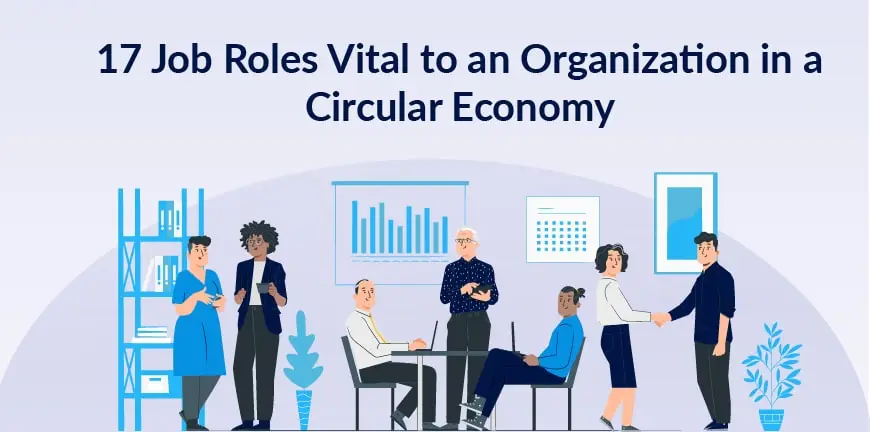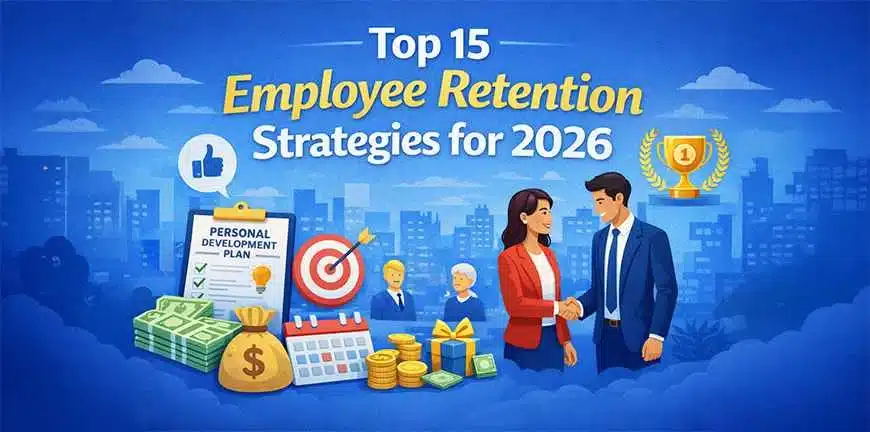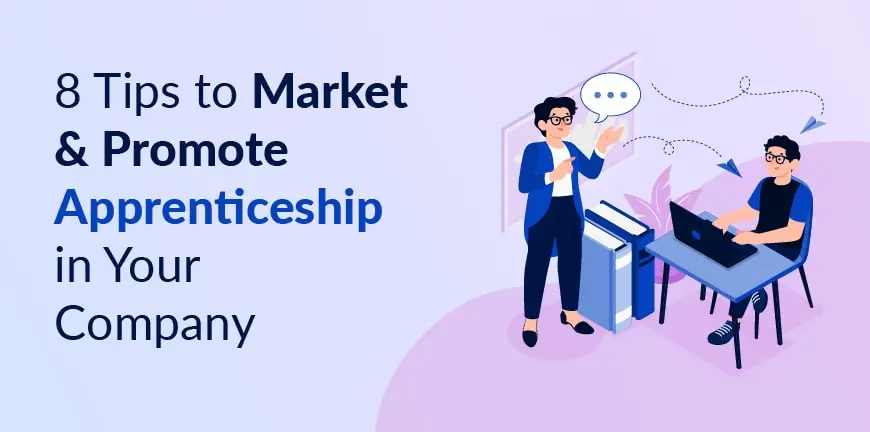
8 Tips to Market and Promote Apprenticeship in Your Company
17/07/2024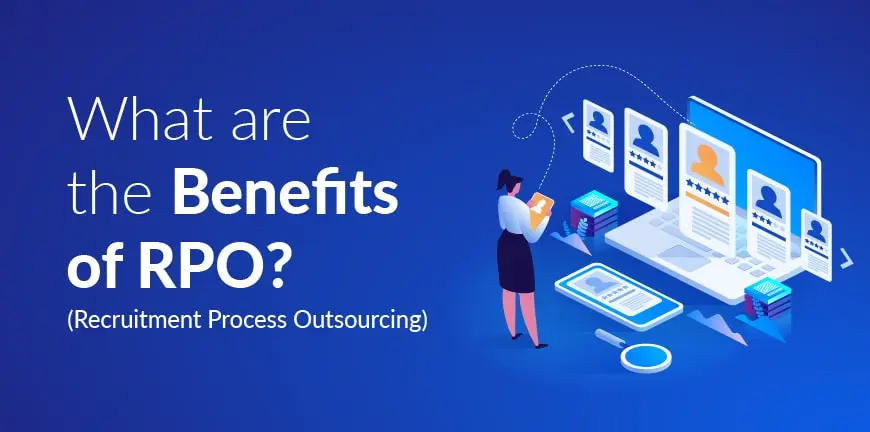
Top 8 Benefits of RPO Recruitment
18/07/2024The SDGs, or Sustainable Development Goals set by the UN, are a way forward for the planet to ease the burden of climate change and extremely high continuous waste discharge that it has carried on its shoulders for a while now. If climate change control and ecological conservation are not key priorities for a government, it is time they became.
Sustainability Recruitment is Key to Growth
Did you know that 78% of customers look for sustainable practices in the company they are buying from? Sustainability is a key pillar for future organizational growth, and a company needs to hire suitable people as it charges down the racetrack to growth, guided by its green vision. There needs to be people who can muster the courage to discuss sustainability issues openly, have the business intelligence to see how it can help your organization, and have the will to follow it through to completion.
The Circular Business Model Versus a Linear One
There are a couple of hundred roles in your company that could ready your business for sustainability, and particularly the circular economy. A circular economy is when you and your competition embrace a business model where you create, deliver, and capture value to the stakeholders, all the while minimizing ecological waste and damage and strengthening communities in the process. Sounds like a lot. Here is a simple diagram to understand it better.
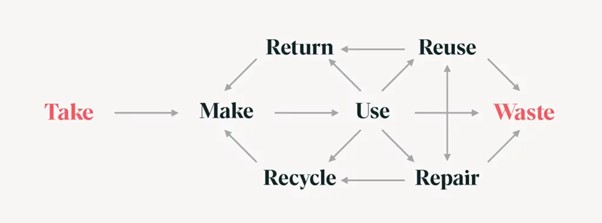
[Reference:boardofinnovation.com]
A straight line from Take to Waste is the Linear Business Model and the lollypop-like model itself is the Circular Business Model. In other words, Return, Reuse, Recycle and Repair are all important in the Circular Business Model. When several top companies in an industry implement the circular business model and get buy-in from others too, we have what we can call a circular economy.
An Example of the Circular Value Chain
Below is an example of the circular value chain for manufacturing.
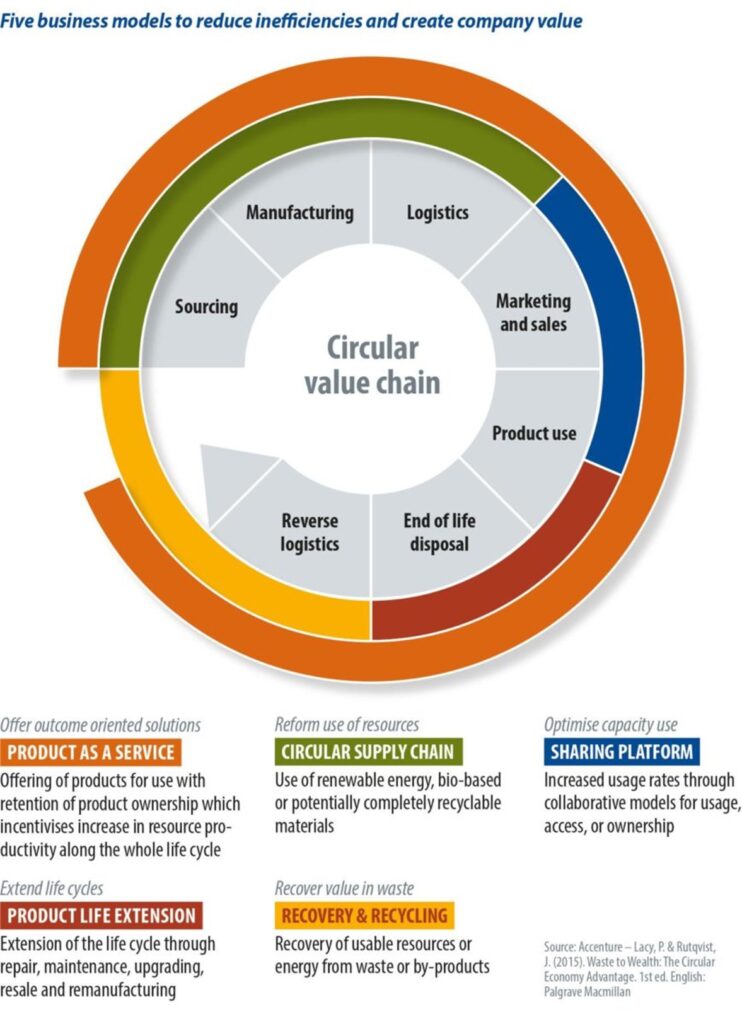
[Reference:pv-magazine.com]
This was designed by Accenture and gives a better idea of the circular value chain for a manufacturing company. It begins with a circular supply chain, moves to a sharing platform for ownership or access during sales and distribution and further use, and then to product life extension through repair and reuse and finally to recovery and recycling. The entire cycle describes the product-as-a-service concept and establishes the circular value chain in a manufacturing company.
Jobs in the Circular Economy
There are several job roles in the circular economy, many of them already familiar to you but requiring a few more additional skills such as negotiation, planning and creativity, all based on sustainability. Let us now look at some of these job roles in the section below.
Circular Supply Chain-Related
Local production:
- Sourcing specialists: Find and source locally manufactured goods and material, reducing need for imports
- Circular supply chain managers: Coordinate how materials and resources flow between different actors in a supply chain
Transportation and Logistics:
- Local delivery drivers: Transport goods and materials within a local area, reducing the need for long-distance transportation
- Circular logistics managers: Help manage the logistics for recycled or reused products and the special care that needs to be taken here
Sharing Platform-Related
Marketing and Sales
- Sustainability Marketers: Help market sustainability to the customers, highlighting the importance of sustainable products
- Market Researchers: Research on how to market sustainability, what products customers are expecting etc.
Product Use
- User Experience Designers: Design the user experience around the sustainable product you are creating.
- Product Managers: Design and develop the actual product you will be selling. Manage the entire product development process.
Product Life Extension-Related
Repair and Refurbishment
- Repair technicians: Skilled in repairing and maintaining a wide range of items and accessories in a particular category
- Refurbishment specialists: Upgrading repaired products to a user-friendly and usable condition
- Product life extension experts: Develop strategies to extend the life of a product, so that recycling is not yet necessary
Recovery and Recycling-Related
Recovery
- Material sorters: Sort and categorize raw materials for further processing
- Material processors: use machinery to break down the raw materials for recycling and repurposing.
Recycling
- Repurposing specialists: Design and develop new products and applications for the repurposed materials
- Repurposing manager: Manage the repurposing initiatives in the company and ensure that the repurposing happens smoothly
Over the Entire Value Chain
Research and Training
- Research specialists: Conduct research on how to improve the product and what materials and methods to use. Knowledge of Generative AI is crucial for such roles.
- Circular economy trainers: Develop training modules to better acquaint the employees and customers of the company practices, and on how to make the circular business model successful
Are You Looking for a Sustainability Recruitment Partner?
Sustainability Recruitment needs a precursor to succeed, an organization based on the circular business model and one that derives strength from its sustainability-inspired values. And sustainability is the need of the hour. Did you know that Alp Consulting, an HR consulting company with more than two decades of recruitment experience, can be a great sustainability recruitment partner for you? Talk to us today.
Contact Us For Business Enquiry

Rajkumar Shanmugam
Rajkumar Shanmugam is the Head of HR at ALP Consulting, bringing over 19 years of comprehensive HR leadership experience across India and international markets. His expertise spans talent acquisition, employee relations, performance management, compliance, and HR transformation. Rajkumar has a proven track record of driving people-centric initiatives, enhancing workplace culture, and aligning HR strategy with business goals. With extensive experience in US staffing operations and global mobility, he continues to lead organizational excellence through innovation and employee engagement.

